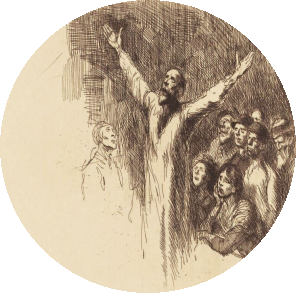Various Laws pt 2: Including How to Identify a False Prophet

In Chapter 18:21-22, we are told of one way in which to identify a false prophet: What he prophesies is not fulfilled. Such a person is a false prophet. In spite of this clear teaching in Scripture, there are multitudes of Christians today who make allowance for the "mistakes" that today's prophets make-and still continue to listen to them. They ignore this verse completely and twist it so it no longer means what it plainly says, What this verse is teaching is that a true prophet will have a success rate of 100% in his prophecies-not even 99%. God has given us enough warnings in His Word to avoid being deceived.
However holy and good a person may be, if what he has prophesied has not been fulfilled exactly-even once- they have prophesied falsely. And they do not humble themselves and acknowledge his or her error, they are a false prophet. God says that we should not bother about such a man thereafter. How many Christians are willing to obey God here?
Chapter 19 is a repetition of the cities of refuge that were to be set apart for those who accidentally killed someone, to escape to.
Chapter 20:1-7: When the Israelites went to war, they were told here to go forth in perfect trust in God without fear. Those who were afraid than in fighting the Lord's battles should go back home, lest they make the other soldiers cool off in their devotion to the Lord. God wants only those who are wholehearted to serve Him even today-those for who His Name and His Kingdom are more important than personal interests.
In Chapter 21, various other laws are given-about marriage matters and stoning rebellious children etc.
In Chapter 22:5, God gave them laws on men's and women's clothing. This was an Old Testament law that was meant to symbolically teach us that the differences God has made between the sexes must be maintained and the different functions that He has ordained for each sex must be respected.
We see God's immense care for His animal-creation in the law that forbade the Israelites from taking a mother bird along with her young, if both were found in a nest (22:6-7). The compassion of God even for animals teaches us one great truth: How much more He will care for us, His children.
In Chapter 23 and 24, we read laws on morality, cleanliness, divorce and various laws that made sure that the poor were not exploited but cared for. It is really profitable for all of us to read these laws given in Chapter 24: 6-21, to see God's intense concern for the poor.
Various other laws are listed in Chapter 25 and 26. And in Chapter 27, a curse is pronounced publicly on those who commit certain sins.
Chapter 28 is a long chapter that is divided into two parts. the first 14 verses are promises about how God would bless them if they obeyed His laws. the next 54 verses are about how God would punish them if they disobeyed His laws. This was the only way God could get man to obey Him under the law-by the hope of reward and the threat of punishment. This is the method we use with little children too, We could call it "the chocolate and stick" method-the promise of a chocolate if they obey and punishment with a stick if they disobey. Under the Law, God treated all men like little children. But under the new covenant, God treats us like adults. Jesus said, "if you love me keep My commandments." (John 14:15). adults sons obey their father out of love and reverence-not out of fear. And thereby we can know whether we ourselves are babies or adults. Do you serve the Lord or give money or service to Him or pray to Him or fast-in hope (expectation) of some reward, or perhaps to escape punishment? If so, you still have the spirit of the old covenant.
In Chapter 31:7-8, we see Moses charging Joshua with the responsibility to lead Israel forward. Again we notice how Moses gave that responsibility to the man God chose, and not any of his own relatives. Unfortunately, we have seen in the history of the Church where leaders of the Church have given relatives positions in the Church, so that they can reap financial positions or build up a more political influence with in the Church. But in the Church of god, we are commanded not to "know no man according to the flesh." (II Corinthians 5:16)- not even our own family. It is rare to find leaders like Moses anywhere in Christendom today.
In Chapter 32, we read the song of Moses. Moses also wrote a psalm- Psalm 90- which is another song.
In Chapter 33, we see God blessing the tribes of Israel. In verses 2-3, we have a lovely statement by Moses that shows how he viewed the laws of God-as and expression of God's immense love for his people."from his right hand went a fiery law for them" (verse 2). What did that prove? "He hath loved the people", and that they also "are in his hand" (verse 3). It is good for us to recognize that God's fiery commandments are a proof of His tremendous love for us. A soft, easy law would have proved that He did not love the Israelites.
In Chapter 34, we read about the death of Moses. Israel entered the promised land, 30 days after Moses died.







 Follow
Follow

